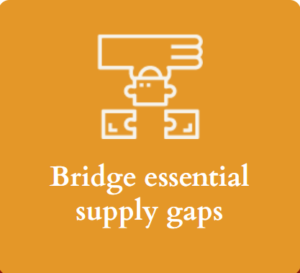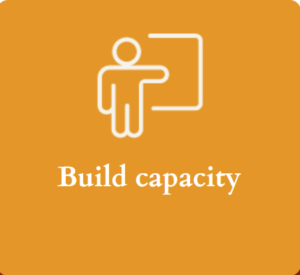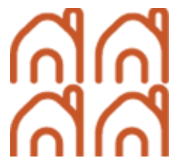Work during COVID
In March 2021, Somalia, like many other countries, was hit hard by the COVID-19 pandemic. The government imposed multiple lockdowns, affecting many of our team members personally. As a result, we had to pause some of our on-ground activities for a few weeks. We quickly devised an emergency response plan to support the government and the communities we were working with, particularly in the rural areas of Dinsoor and Baidoa, to help combat the pandemic. Our guiding principle was to focus on prevention at the village level.
We adapted our interventions to ensure improved identification and tracking of high-risk COVID populations, including the elderly and pregnant women. We supported the government by monitoring and supervising the response efforts and worked on ways to ensure the continuity of critical maternal and child health services.
We leveraged our grassroots knowledge of the local health system and developed a two-pronged COVID-response plan:
1.  We provided frontline healthcare workers and staff at facilities with personal safety kits and necessary screening tools such as masks, gloves and sanitizers.
We provided frontline healthcare workers and staff at facilities with personal safety kits and necessary screening tools such as masks, gloves and sanitizers.
2.  We equipped frontline workers and health staff with COVID knowledge and skills, including COVID-response protocols, safety practices, the proper use of screening equipment, and effective counseling.
We equipped frontline workers and health staff with COVID knowledge and skills, including COVID-response protocols, safety practices, the proper use of screening equipment, and effective counseling.
Our COVID response in 2021 reached approximately:
 1,800 villages
1,800 villages
![]() 5,000 health staff
5,000 health staff
![]() 90+ healthcare facilities
90+ healthcare facilities
![]() 11k people across Dinsoor and Baidoa, benefiting these communities. The district highly appreciated our support.
11k people across Dinsoor and Baidoa, benefiting these communities. The district highly appreciated our support.
Our discussions with frontline workers and district administrators revealed the need for increased data sharing and collaboration for various COVID-related tasks. We modified the solution to identify, monitor, and manage individuals and households at high risk of contracting COVID, such as infants, pregnant women and elderly people.
Using the village maps initially created to track high-risk pregnant women, frontline workers began marking households with various high-risk codes for COVID (e.g. 3D for women in the final trimester of pregnancy, and 60+ for the elderly population). They could then plan targeted efforts for these groups.
Pregnant women in their final trimester require special monitoring and counseling to prepare for safe institutional delivery. Frontline workers could avoid risky assignments, ensuring that asymptomatic pregnant women were not mistakenly placed in COVID-19 hospitals. This collaborative system saved the lives of many mothers and newborns.
Maternal and Child Health during COVID
The lockdown significantly impacted critical maternal and child health services in Somalia, leading to a backlog in routine immunizations for children, prenatal check-ups for pregnant women, growth monitoring for children and other essential health services. This neglect had the potential to severely impact key metrics such as infant mortality, maternal mortality and child malnutrition, issues Somalia had already been struggling with.
We worked tirelessly to ensure the full resumption of maternal and child health services in the areas we served while strictly adhering to COVID safety protocols.
Capacity Building to Combat COVID
Frontline health workers were tasked with critical responsibilities, such as spreading awareness on prevention and control, identifying potential COVID cases, supporting contact tracing, and implementing quarantine measures.
We trained different health workers through virtual meetings to bridge the knowledge and skill gaps. Key training topics included:
- Understanding COVID symptoms
- Prevention and control methods
- Special care for high-risk groups (e.g., elderly, pregnant women)
- Managing symptomatic cases and contact tracing
- Protocols for home quarantine
- Tackling stigma associated with COVID
- Frontline worker safety protocols while handling suspected cases.
Monitoring and Supervision
Effective monitoring and data reporting were essential for implementing the COVID response. We supported the district authorities by creating easy-to-use formats for monitoring various COVID activities. Examples of our support include:
Screening Format
We assisted the district administrations with creating monitoring formats for frontline workers involved in the “Kill Corona” campaign, which included fever screening and managing symptomatic cases across the district.
Overcoming Adversity and Empowering Women
Mariam, a 29-year-old woman from Baidoa, endured immense hardship due to the instability in her community. While working tirelessly to support her family, she became a victim of domestic violence, suffering years of emotional and physical abuse. With no access to legal or psychological support, Mariam felt trapped and isolated, unsure of how to escape her situation.
One day, with the help of a trusted friend, Mariam was introduced to PDC. Recognizing her urgent need for assistance, PDC provided her with medical care to treat her injuries and enrolled her in a psychological counseling program to help her heal from the trauma she had endured. Through one-on-one therapy and support groups, Mariam found the strength to regain her confidence and rebuild her life.
To help her achieve financial independence, PDC connected Mariam with a vocational training program, where she learned sewing and tailoring skills. With additional support, she was able to start her own small business, designing and selling clothes. Today, Mariam is a successful entrepreneur, providing for her children and mentoring other women in her community. She has also become an advocate for women’s empowerment, using her voice to support those facing similar challenges.
Mariam’s journey is one of resilience, strength, and hope demonstrating the transformative impact of support and community empowerment through PDC.
A Child Survivor of Torture in Custody
Ahmed, a 16-year-old boy from Dinsoor, became a victim of state-sanctioned torture after being wrongfully detained by government forces. Ahmed was accused of being involved in anti-administrative activities based solely on hearsay. During his detention, he was subjected to severe physical torture and psychological abuse by his captors, leaving him traumatized and scarred.
When Ahmed was released, he was referred to PDC by a local community leader who had learned of his plight. Ahmed was in a fragile emotional state, suffering from anxiety, depression, and fear. PDC immediately provided Ahmed with medical care to address his injuries, followed by a series of counseling sessions aimed at helping him process his trauma.
Through PDC’s child-focused trauma rehabilitation program, Ahmed participated in individual therapy, where he could freely express his feelings of confusion, anger, and fear. The program also provided a supportive environment where Ahmed learned coping mechanisms and stress management techniques. Additionally, PDC worked with local schools to ensure Ahmed could continue his education, as he had missed out on schooling due to his detention. Today, Ahmed is back in school, and his emotional well-being has greatly improved. He has expressed a desire to pursue a career in law to help prevent future injustices and provide a voice for other tortured minors.
A Refugee Survivor of Torture
Fadumo, a 45-year-old mother of three, fled from her hometown in southern Somalia due to escalating violence. During her perilous journey to Baidoa, Fadumo was captured by a militia group that subjected her to physical and psychological torture. She was forced to perform labor under threat of violence, and during this time, she was severely beaten and humiliated.
After arriving in Baidoa, Fadumo was referred to PDC through a refugee assistance program. The initial assessment revealed that she was suffering from severe physical pain, post-traumatic stress disorder (PTSD), and extreme anxiety, but she was reluctant to speak about her experience due to the shame and trauma.
Through PDC’s support, Fadumo was able to access much-needed medical care, including treatment for chronic pain resulting from the physical abuse. She was also enrolled in trauma-informed therapy and participated in group sessions tailored specifically for refugee women who had survived violence. Over time, Fadumo began to rebuild her self-confidence and sense of security. PDC’s legal aid program also assisted her in claiming asylum and fighting for her rights as a refugee.
PDC’s social reintegration program provided Fadumo with a small business grant to open a shop selling traditional Somali food and crafts. Her children, who had been out of school, were also enrolled in local educational programs. Today, Fadumo has regained her independence and is an active member of the community, advocating for the rights of refugees and women.
Overcoming Detention and Advocacy for Human Rights
Mohamed, a 34-year-old political activist, was detained during a period of heightened political tensions while advocating for democratic reforms. During his time in custody, he endured significant hardships, including prolonged isolation and psychological distress, which left him struggling with fear and uncertainty about his future.
Upon his release, Mohamed was referred to PDC by a network of human rights defenders. Recognizing his urgent need for support, PDC provided him with immediate medical care, including treatment for stress-related ailments and physical therapy for long-term pain. He also received psychological counseling to help him process his experiences and regain confidence.
As part of his recovery, Mohamed participated in PDC’s legal empowerment workshops, where he learned about his rights and ways to advocate for others. PDC also helped him connect with local media, enabling him to raise awareness about human rights and access to justice. Today, Mohamed is a dedicated advocate, working to support others who have faced similar challenges and promoting peaceful dialogue on human rights issues.
Rebuilding a Life After Exploitation
Ali, a 28-year-old man, endured severe hardship after being deceived by traffickers who promised him a well-paying job abroad. Instead, he was taken to an isolated location and forced into labor under inhumane conditions. He worked long hours without pay, suffered constant threats, and had no means of contacting his family. His health deteriorated due to poor living conditions, exhaustion, and malnutrition.
After months in captivity, Ali managed to escape with the help of local villagers who recognized his dire situation. He was later referred to PDC by a humanitarian organization. PDC’s medical team provided him with urgent care, treating his injuries and addressing severe malnutrition. He also received psychological counseling to help him recover from the trauma and regain his confidence.
To help Ali rebuild his life, PDC enrolled him in a vocational training program, where he gained essential skills in small business management. With PDC’s support, he received a microgrant to start his own restaurant. Today, Ali runs a thriving food business and has become an advocate against human trafficking, raising awareness in his community and supporting other survivors in rebuilding their lives.
